These are the scanned pages of Dr. Kelly’s comments on my paper for your review. Her handwriting is legible, and it’s probably better your read it for yourself if you are interested. You can imagine perhaps what I was feeling as I read them while she taught that class and leveled her charges against me. On another page, I have scanned my response to Dr. Kelly. Between the scans are my editorial comments about the scans.
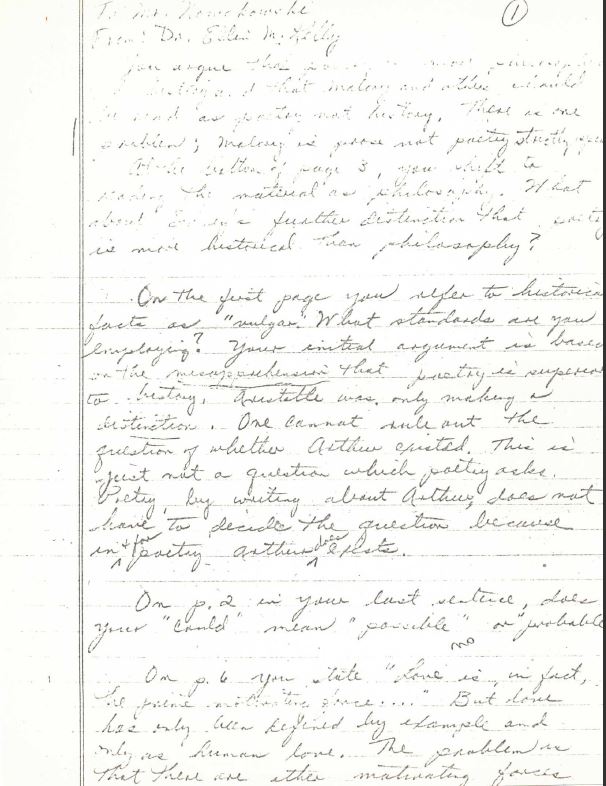
The first page (above) of her response to my paper begins with the word “You argue that…” but the remainder of the first paragraph isn’t legible. However, I responded to it in my rebuttal, which you can find in another document on this website TO: Dr. Ellin M. Kelly FROM: James A. Nowakowski. In the second paragraph, she is asking me what standard I use to refer to historical facts as “vulgar.” She says I have a “misapprehension” that poetry is superior to history, and her proof is that Artistotle was making only a distinction…that you can’t rule out the question of whether Arthur existed. She then argues that for poetry Arthur does in fact exist.
Somehow she got tangled up, as my rebuttal will show. Looking back now. the question of historical existence is really what is going on now in this country. But Thomas Malory, the guy who wrote it, was a gangster who exploited the increasing breakdown of law and order across England according to the British Library. He wrote the book while he was in prison. It’s a story, not a “history.” I was always taught to “read the book,” and ignore the author. So too when Arthur was already a “legend,” and as we know with legends, especially in the 1400’s, can be reshaped over time.
So when I read the book, I read the book, not as history, but as a “novel.”
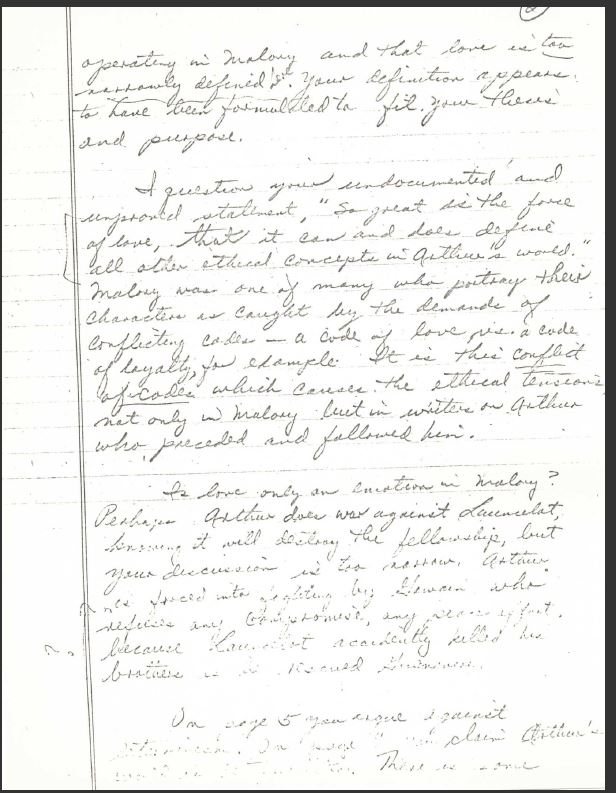
On page two she questions my “undocumented and unproved” statement about the force of love defining all ethical concepts in Arthur’s world. She cites other authors who preceded and followed Malory as using a “conflict of codes” that causes the tension. Her example is a code of loyalty versus a code of love. Then asks, “Is love the only emotion in Malory? She says my discussion is “too narrow.”
You might imagine me reading this, sitting in class and having her throw comments at me in front of the class though only she and I knew they were directed at me. I was devastated. But I kept reading — and listening — because her attack on my paper was really the key to my getting an A and graduating with honors. Was I that off base?
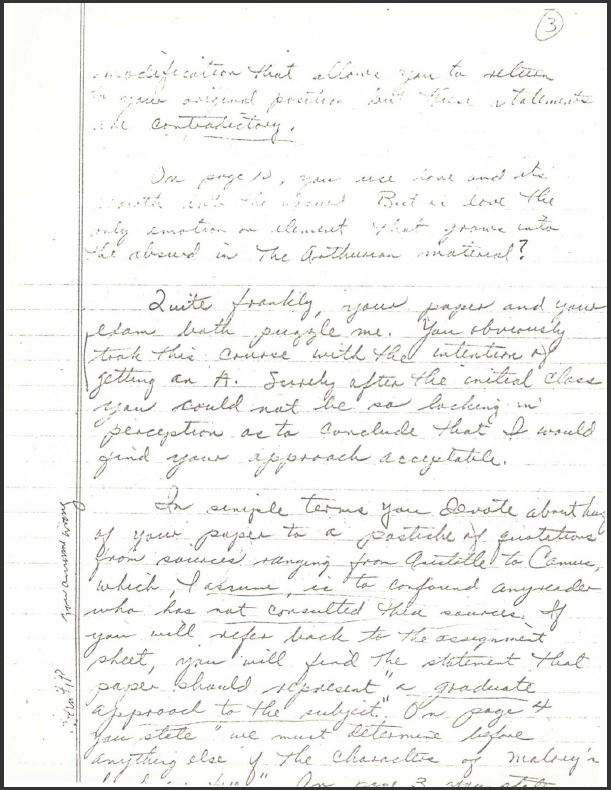
The third page is the big wind up that concluded her attacks. The paragraph that begins,”Quite frankly, your paper and your exam both puzzle me” explains my mistake in asking her for advice upfront to get the A. When I read, “You obviously took this course with teh intention of getting an A. Surely after the initial class you could not be so lacking in perception as to conclude that I would find your approach acceptable.”
When I read that, I knew I was doomed, that approaching her upfront with my objective was never going to happen. She says I was puzzling her, but yet knew enough to crack the puzzle by saying in the next paragraph my paper should represent “a graduate approach to the subject.” In the previous sentence, she said that I used a “pastiche of quotations” to “confuse any reader who has not consulted these courses.” You’ll see in my rebuttal how absurd that charge is.
But then she can’t stop herself. She keeps attacking the paper. I guess I was a true puzzle to her.
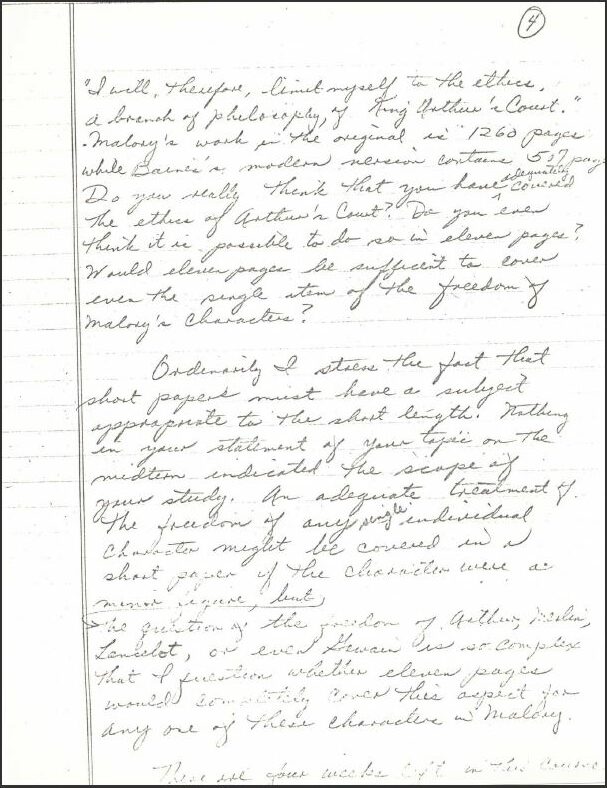
She says on page four that the paper is not long enough to deal with the topic of my choice, which is the freedom of Arthur and everyone around him to make choices. She asked, “Would eleven pages be sufficient to cover even the single item of the freedom of Malory’s characters?”
So she counts pages, I thought, and continued to sink lower and lower in my estimation of myself. I always took things seriously, especially in the quest to learn about my self. You simply have to read my journals, or know the people in my life to know this is true. When things go South, I always look at myself first before seeking external clues to the situation. Her criticism was no different: my self esteem deflated like a balloon being slowly released of the air inside. But the nature of a balloon that has been deflated is that you can blow it up again. I had just been through the rigorous comprehensive exams as I said. I had a high enough grade point to need one more A to do the honors thing. Had I misjudged myself all that time? Was she right? I don’t belong here?
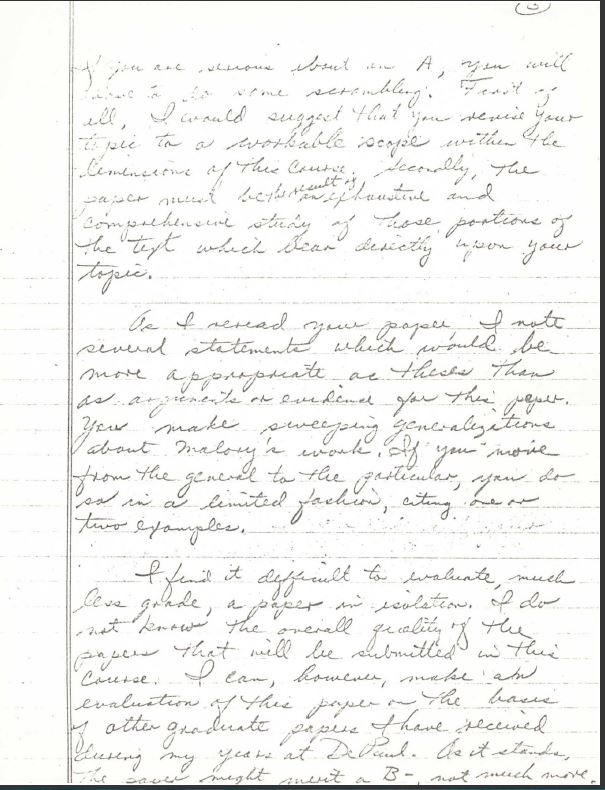
The last page of her attacks tells me I have to do some “scrambling” if I want the A. She suggests revising the topic to a workable scope. She then said something curious. “As I reread your paper, I note several statements which would be more appropriate as theses than as arguments or evidence for this paper.” So, I thought, she read it more than once. That’s a clue. She then did something odd: she graded the paper! “The paper as it stands might merit a B-, not much more.”
When I read that, I realized something was not right in the attacks. Her overview and attacks on something like this were so severe, and remember, I was a teacher too, would have warranted an “F” not a B-. But she was giving me a B-? How could that be?
I went home, read her attacks over several times, re-read my paper, talked to Sandy, my wife, and made the decision. I was going to fight this, which means, I had to challenge the instructor.
As I said, I learned a lot since then, and maybe, if I really wanted the A, I would have sucked up to her critique and attacks, feigned the knock downs and like others in the class fawned over her narrowness with a rewrite. But fawning has never been in my nature. Although years later, one of my employees accused me of being a “groupie” when I went downtown to hear Marcus Luttrell of Lone Survivor fame (I had read his book which is a great business book by the way) speak with my wife an a luncheon. However, I’ve never been a true follower except to God. And even then, doubt creeps into my mind now and then and I still question everything. What remains after the questioning is usually the truth, at least for the moment. That’s what I have learned: real truth stays with you, even after the challenges. Back then I just thought: OK, madam, let’s see what you’re made of.
Now, years later, I wouldn’t have changed a thing with what I did, nor the outcome. It was a great fight, even though I lost the A. My response to her attacks is in another section on this website.
